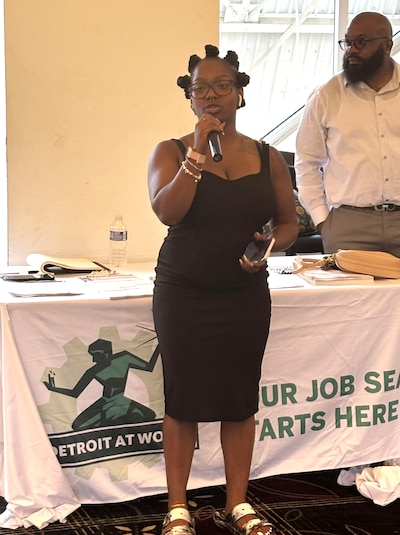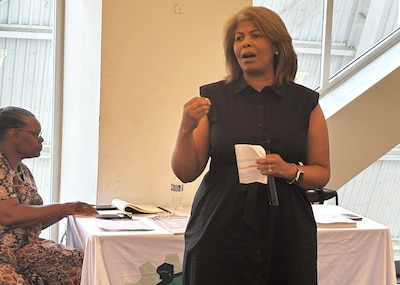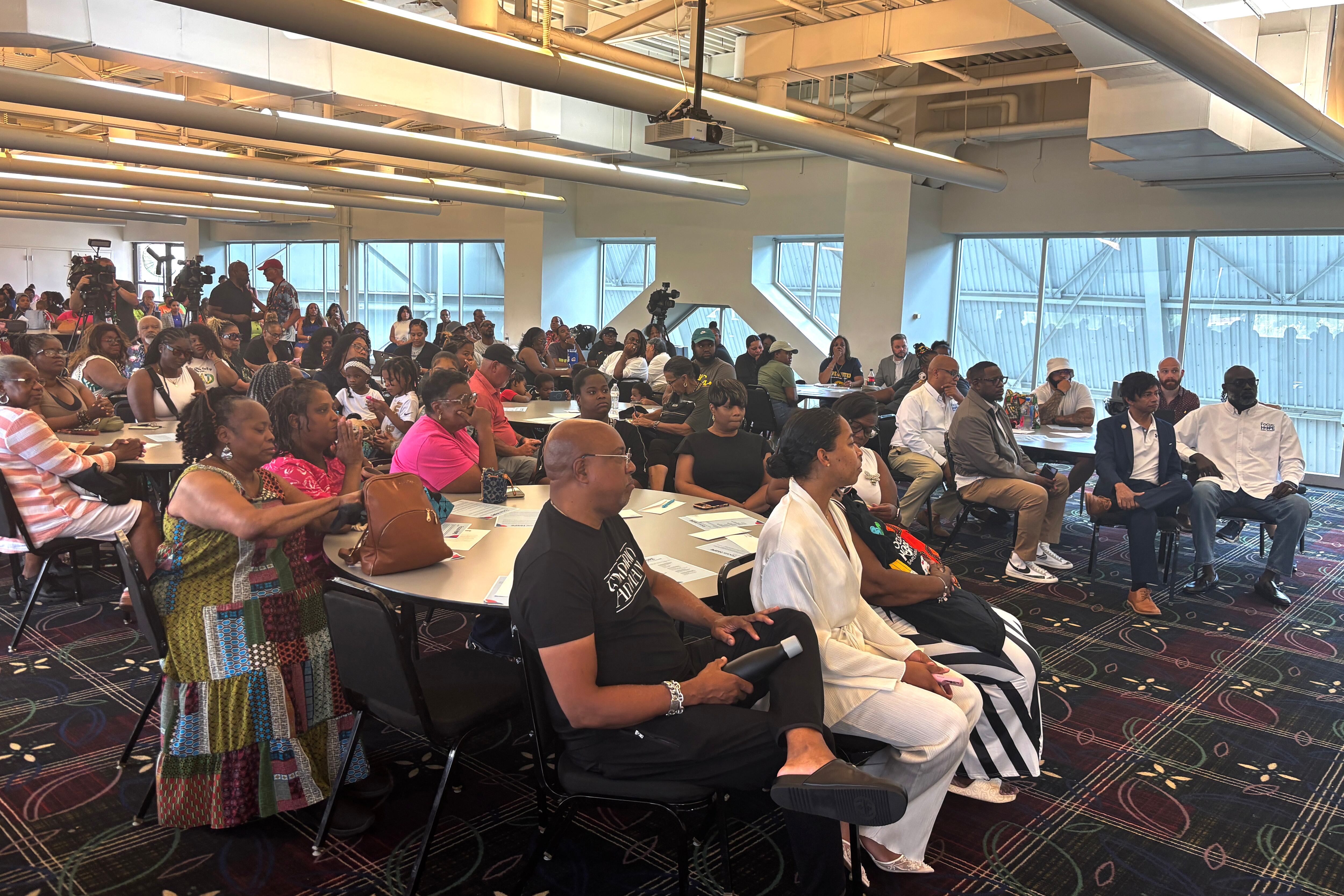Sign up for Chalkbeat Detroit’s free newsletter to keep up with the city’s public school system and Michigan education policy.
Kyra O’Guinn and her young family have relied heavily on Focus: HOPE’s Early Head Start programming to help raise their daughter since she was just 4 months old.
But that safety net was eliminated when the longtime Detroit nonprofit announced that it has not received federal Head Start funding for the 2025–26 school year.
The closure of the Head Start program affects more than 300 Detroit-area children like O’Guinn’s, leaving her and other parents scrambling for alternative arrangements while as many as 70% of its 107 early learning staff members face layoffs, said Portia Roberson, CEO of Focus: HOPE, which provides early learning, job training, and food support to families.
For 10 years, Focus: HOPE’s Head Start programs were funded through a relationship with Starfish Family Services. Focus: HOPE was a subrecipient of a grant Starfish received from the federal government to provide the program. Last year, though, the two organizations agreed to apply for the funding individually, meaning Focus: HOPE would have to seek the federal money on its own. That funding request was formally rejected last week without explanation.
It isn’t clear whether the decision is connected to the uncertainty facing Head Start nationally due to the Trump administration’s temporary pause of funding and the closure of regional offices.
O’Guinn and her husband both work, and she’s also pursuing a degree in marketing and public relations. She said it’s difficult to consider next steps for their now 3-year-old daughter and another younger child with no nearby options for child care or family to pitch in.
“To take something away like this from us and our neighborhoods is you telling us that you want us to continue to be underserviced,” O’Guinn said during a Focus: HOPE town hall hosted on Tuesday. “It left us empty-handed, and we really needed that support.”

The loss of funding affects families in Detroit’s 48202, 48206, 48211, and 48238 ZIP codes, which are located in city neighborhoods like Midtown and Forest Park and includes neighboring cities like Hamtramck. In addition to having one of the highest rates of poverty in the state, three of the four ZIP codes were characterized as having “insufficient” licensed child care access, with three or more children for each available slot, according to data analyzed by Boston University’s Child Opportunity Index.
Roberson said Focus: HOPE will continue to operate some of its early childhood programming through state funding it receives for 4-year-olds enrolled in its Great Start Readiness Program, or GSRP, Michigan’s free prekindergarten program.
In the meantime, Roberson encouraged parents attending the town hall to advocate for restoring the agency’s federally funded programming provided by Head Start, designed to promote school readiness for infants, toddlers, and preschoolers from families that meet income eligibility requirements.
Roberson said Focus: HOPE plans to work with the city of Detroit, community partners, and other child care providers in the area to figure out where children can enroll without significant disruption.
In addition to educating children through its preschool program for 4-year-olds, Focus: HOPE’s early learning programs provided more than 250 mothers with peer-to-peer support for pregnancy, birth, breastfeeding, and early parenting — all services impacted by not receiving the grant.
“We’re actively working to figure out how many classes we can run with some of the other funding we receive,” Roberson said. “We’re looking for other funding sources so that we can try to serve as many of those 300 children as possible and then pivoting and trying to figure out where are some affordable, solid places that we can send other children that parents can access easily.”

The decision to seek the Head Start funding independently came because Starfish Family Services had indicated it no longer wanted to serve as a grantee with subrecipients, Roberson said. Starfish Family Services did not immediately respond to a request for comment.
Focus: HOPE applied for the funding on its own in December, Roberson said, while continuing to operate under the Starfish’s grant funding that ran through the end of July. Expecting to hear from the federal government early in the year, Roberson said she first was updated in March that there could be a delay in decisions on funding due to the Department of Health and Human Services’ Office of Head Start announcing it was shutting down five regional offices.
She said she contacted Michigan U.S. Sens. Gary Peters and Elissa Slotkin, both Democrats, in June to see if they could find out more after hearing rumors that some organizations might not be receiving funding.
Late last week, Roberson said she was informed by the federal Administration of Children and Families, which is part of the Department of Health and Human Services, that it had not received funding, but that Starfish and MiSide, another Detroit agency, had.
“We really don’t know why, because, to be honest, while it was a competitive grant process, it was not competitive in the sense that anyone else was applying to service the kids in the four ZIP codes we were currently servicing,” Roberson said. “So, essentially, by not funding us, it wasn’t as if they said, ‘Oh, we think that the application from some other organization was a better application, and we’re sending the kids there.’ They just said we’re not going to service you in these ZIP codes.”
Officials from the Health and Human Services department didn’t respond to a request for comment.
‘I don’t need a day care … I want her to be learning’
Roberson said Focus: HOPE applied for 100 additional Head Start slots and $14 million in total federal funding to serve around 400 children, a significant increase from the $6 million it operated on this past year. The intention, she said, was to see if it could accommodate children who were on a wait list.
“We were hoping this would be our opportunity to grow our program a little bit and have even more students participate in a Head Start program,” she said. “This obviously is not that and it’s going to be a significant hit to our overall Focus: HOPE budget.”
After enrolling her 4-year-old daughter in the Head Start program through Focus: HOPE a few months back, parent Sade Walker said she was concerned about having to potentially find a new place for her daughter this fall.
Though the Great Start Readiness Program might still be an option this fall, Walker said she’s concerned about receiving the news so close to the beginning of the school year.
“It’s probably going to be hard to find a school,” Walker said. “I don’t need a day care or a babysitter. I want her to be learning.”
Head Start overall has been dealing with uncertainty, beginning in January when the Trump administration paused federal funding for the program via an administrative order. That pause was eventually rescinded, but a later decision to shut down five regional offices raised more concerns. One of the regional offices that closed was in Chicago, which oversaw Head Start centers in Michigan, Illinois, Indiana, Minnesota, Ohio, and Wisconsin.
In a statement about the closure of the Focus: HOPE programs, Peters said Head Start provides Michigan families with access to early childhood education while helping parents enter and stay in the workforce.
“That’s why we must ensure that every single community in our state receives the funding needed to administer this important program and support our working families,” Peter said in the statement. “I’ll keep working to ensure Focus: HOPE can continue serving children and families in Detroit.”
Democratic U.S. Rep. Shri Thanedar, who attended Tuesday’s town hall, said the decision not to fund Focus: HOPE Head Start programming in some of the poorest ZIP codes in the country is another example of the administration’s “reverse Robin Hood” approach of “taking from people who need it and giving it to billionaires.”
“We cannot rest,” he said, “until this is reversed.”







